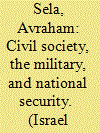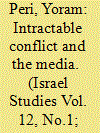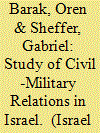|
|
|
Sort Order |
|
|
|
Items / Page
|
|
|
|
|
|
|
| Srl | Item |
| 1 |
ID:
077868


|
|
|
|
|
| Publication |
2007.
|
| Summary/Abstract |
Israel's unilateral withdrawal from south Lebanon in May 2000 was a unique case in which a public campaign led by a grass-roots movement shaped the government's policymaking on national security. That this withdrawal was decided and implemented despite the IDF's reservation and adherence to the quarter-century old concept of a 'security zone' in south Lebanon, further underlines the unprecedented nature of this case in a state where the military institution is a key player in determining the state's security policies. The article explains this case by examining the origins of the 'security zone' concept and the causes for its sustenance and decline along with the changing nature of civil-military relations in Israel since the late 1970s. The article suggests that civil society succeeded in its campaign against the 'security zone' because the concept had been obsolete long before, yet this success must be understood within the context of shifting perceptions and values in the Israeli society toward security and individual sacrifice
|
|
|
|
|
|
|
|
|
|
|
|
|
|
|
|
| 2 |
ID:
077869


|
|
|
|
|
| Publication |
2007.
|
| Summary/Abstract |
Relations between the media and military affairs, or the media and the security field, have been dramatically altered since 1973 and even more so since the early 1990s. Media outlets have transformed from subservient and deferential into a confrontational model, and the military ceased to be a "sacred cow". If, in the past, the media were only as a tool of the state, they have seemingly also been regarded as reflecting society and individuals. However, a deconstruction of media and news media texts reveals deep structures that have not changed. As in the past, so in contemporary time, the media continue to be a major agent in the development of the Israeli military ethos. They play a significant role in the construction of the image of the enemy (be it the Arabs, the Palestinians, or Gentiles at large). They nourish the positive image of the Jewish hero and of war ethos. They transfix macht (power) values and contribute to the construction of the gender structure of Israeli society. Eventually they nourish the aspired model of a warring society. Therefore, as research of civil military relations in Israel historically focused on the modes by which the media assisted the survival of a besieged society under conditions of prolonged war, while keeping its democratic spirit, this chapter will demonstrate how the media restrained the development of civilian ethos and impeded the development of a post-war society in spite of the accelerating decolonization process
|
|
|
|
|
|
|
|
|
|
|
|
|
|
|
|
| 3 |
ID:
077867


|
|
|
| 4 |
ID:
077866


|
|
|
|
|
| Publication |
2007.
|
| Summary/Abstract |
The aim of the article is threefold: first, to define and examine the major approaches to the study of the relationship between Israel's security sector and civilian realms (political, social, economic, and discursive), which we refer to as the "traditional," "critical" and "new critical" approaches; second, to emphasize the theoretical and empirical "gaps" that exist in the scholarly treatment of the relationships between actors operating within both types of spheres, and particularly with regard to the more informal aspects of their interplay; finally, to suggest ways to overcome the lack of adequate treatment of these highly informal exchanges by employing insights from the expanding literature on policy networks and social networks and demonstrating how these networks, which can be identified in the Israeli case, influence general and concrete policymaking on both the national and local levels
|
|
|
|
|
|
|
|
|
|
|
|
|
|
|
|
| 5 |
ID:
077870


|
|
|
|
|
| Publication |
2007.
|
| Summary/Abstract |
Recent years have witnessed a significant rise in the numbers of "national religious" soldiers in IDF combat units. As a result, their sociological and cultural profile has become a matter of considerable public and academic interest. Particular attention has been focused on the strains that might be placed on the military loyalties of national religious troops, should they be required to carry out missions that they interpret as being contrary to Jewish religious teachings. In this context, their behavior when confronted with orders to dismantle Jewish settlements in the occupied territories is generally considered to constitute the litmus test of their allegiance. The article contends that national religious soldiers in the IDF do indeed often sense a conflict of loyalties between their military duties and their Jewish religious obligations. Research indicates, however, that such tensions cannot be attributed solely, or even mainly, to factors associated with their commitment to possession of the Holy Land. The article argues that the principal sources of tension between religious observance and military service in Israel lie elsewhere: in matters of an essentially ritual and behavioral dimension. From that perspective, the almost complete absence of conscientious objection on the part of national-religious IDF troops during the 2005 disengagement from the Gaza Strip and northern Samaria was by no means an aberration. The article is based on both in-depth interviews and on a reading of primary materials, including published epistolary exchanges between soldiers and their rabbis.
|
|
|
|
|
|
|
|
|
|
|
|
|
|
|
|
|
|
|
|
|